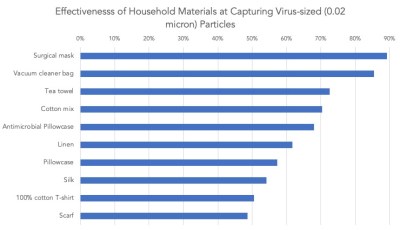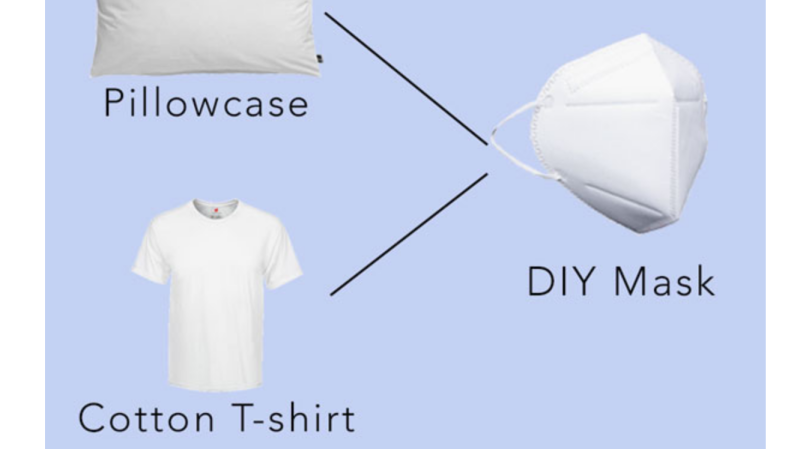Due to the worldwide pandemic of COVID-19, there has been a huge shortage of N95 masks. [] from Smart Air has been working on designs for a DIY mask that may be able to protect those who haven’t been able to secure their own masks. While there may be an abundance of memes around the various material people have been able to use to substitute for the filters, there is some very real science behind the sorts of materials that can effectively protect us from the virus.

According to a studied performed at Cambridge University during the 2009 H1N1 flu pandemic, while surgical masks perform the best at capturing Bacillus atrophaeus bacteria (0.93-1.25 microns) and Bacteriophage MS virus (0.023 microns), vacuum cleaner bags, and tea towels, and cotton T-shirts were not too far behind. The coronavirus is 0.1-0.2 microns, well within the range for the results of the tests.
As it turns out, cotton homemade masks may be quite effective as alternatives – not to mention reusable. They also found out that double layering the masks didn’t help with improving the protection against viruses. On the other hand, one significant design choice was the breathability of the material. While vacuum cleaner bags may be quite effective at keeping out small particles, they aren’t as comfortable or easy to breathe in as cotton masks.
Have you tried making your own cotton masks? In a time when hospitals are running low on surgical masks, it’s possibly the best option for helping to keep much-needed medical supplies in the hands of those helping at the front line.
[Thanks to pie for the tip!]
















Anyone have thoughts on using drapery liner blackout material.. i have yards of it on hand. it definitely has a very tight weave. Could I use it as a liner along with cotton or insert it into a pocket within the mask as a liner?
In the spirit of “every little bit helps”, I would say go for it, IF it is still breathable; however, there is essentially no woven fabric that can filter really small particles. Only non-woven/meltblown fabrics can do that. But if you can still breathe reasonably well through it, it can’t hurt! :)
(And surprisingly, lack of breathability does not really speak to the overall ability to filter. Small particles can still take the same circuitous route that your air has to take, through the comparatively GIANT holes between woven fibers, to get to your nose and mouth. You just have to work harder to get your air!)
Hmmmm…wonder how many extra calories we could burn by using overly difficult masks?! 😆
.
I’ve been wondering about using anti-slip painters drop cloth, like this https://www.dollarama.com/en-CA/p-dropcloth/3055441
after opening smelled like chemical and I abandoned idea..then went back to it and smell was gone. can’t figure out material content though similar products appear to be made of polyethylene (VS polypropylene). if not suitable for mask will be making shopping bags I guess
I’m wondering about anti-slip painters drop cloth like this one..https://www.dollarama.com/en-CA/p-dropcloth/3055441
on opening pkg there was strong chemical smell which quickly dissipated.. doesn’t mention material but similar products appear to be polyethylene VS polypropylene..if can’t use for masks then will be making shopping bags I guess ;)
The problem with coffee filters is they’re designed to run a liquid through relatively quickly, and tend to only filter down to about 20 microns. BUT if you use it as a disposable layer in a cotton/cloth mask, it’ll keep the layers separate and prevent wicking, so you’d probably get more than the 2% or whatever tiny increase in filtration the researchers saw from doubling a cotton mask.
If you use a filter inside your mask, should it be discarded after each use?
It depends on the filtering material. Polypropylene can be washed and dried along with the cloth mask. A piece of merv-13 shouldn’t be washed but can be sprayed with alcohol, sterilized in water or oven or microwave.
Just received and cut out some soft Merv 13 for mask filter inserts. My question: Can this gauzy material be hand washed in hot soapy water? Will it hold up? It feels fragile. OR, can it be microwaved and for how long?
For those panicking over fibreglass in filters, you can rest easy; they don’t:
https://www.vacuumcleanermarket.com/news/do-vacuum-bags-contain-fiberglass/
https://www.energyvanguard.com/blog/can-you-use-hvac-filters-coronavirus-masks
I have a 3M 6000 half mask , with cartridge, particulate pre filters and retainers. Of course the particulate P3 pre-filters are really difficult to find, so I was considering to use vacuum cleaners bag from a German company (I’m based in Europe). Their bags filter 99.9% of fine dust down to a fragmentation of 0.3µm, corona virus: 0.12 – 0.16 µm. Better than nothing. I can cut the vacuum cleaner bag in the shape of the pre filter. The company is not recommending to use their bag for making mask: if the fit is poor, the optimal protection of mouth and nose is not guaranteed. The poorer fit could also be favoured by the generally less elastic vacuum cleaner bags. Their bag do not contain harmful material.
Another material i’m looking into for making masks is Tyvek by Dupont, though there are gazillions of variety. Actually it is already used by Dupont to make protective medical suit and in some cases surgical masks. I’ve contacted them and let you know further details.
Here’s a new parametric mask design I just finished – designed for “rigid” 3D printers (no TPU) and available on OnShape with parameters you can tune and tweak to fit your loved ones faces. (I also give g code appropriate for 150×150 printers and the STL files in case CAD is daunting.)
https://bloggerbrothers.com/2020/04/19/3d-printer-covid-mask-design/
Direct onshape link (in case you hate blog articles):
https://bit.ly/2XMB98s
Hi, new here and making masks. Found something called oly-fun fabric through joan fabrics online. Its polypropylene fabric. The colors are load but will this work well for filtration inside a cotton mask?
https://www.joann.com/olyfun-10-yard-bolt/zprd_14065353a.html
YES!! Oly Fun is perfect.
I’ve done research also. I’m making 5-layer masks. I start with cotton for the two outside that layers has been pre-washed in very hot water and then ironed; Then I fuse Pellon 950F Shirtailor (medium weight) to both cotton layers. The Shirtailor starts out a little stiff but as the mask is washed, it softens up. It must be non-woven fusible. My last layer is a tea towel (available at WalMart) that has been pre-washed in very hot water and which can be removed by constructing a pocket in back. That makes your 5 layers. If breatheability becomes an issue, remove the tea towel.
For the nose bridge, I purchased a disposable aluminum foil cookie sheet (the kind you use for carry out dinners). They are easy to cut. I make the pieces of foil wide enough to fold in half for added stability. I use duct tape to to cover the edges and ends and sew it in to the back side of the mask. I am using large elastic pony tail ties for the holders around the ears. I’ve been told that flat elastic ends up chafing the back of the ear. If you can’t find elastic pony tail holders that are at least 7” in length and are at least 3mm in circumference, ordered them from Amazon. I ordered 4mm but they may be a little thick. Pony tail holders are 2.5mm.
Last, I use a pattern for an Olson mask. They are available on Pinterest or just about anywhere. They fit the face better than the pleated kind. For males, I increase the size by 1/4” on all sides because they tend to have slightly larger faces. For children I decrease the size by 1/4” on all sides. Because I have a serger, I finish all my inside edges (not required) so that they’ll withstand frequent washings. Constructing an Olson mask takes about 5 minutes longer. You can make the more common pleated mask if you wish.
I don’t know the efficacy of 5-layered mask, but I’m gonna give those little suckers a hard time to get into me!
Additional comment: For those who feel Pellon 950F is too stiff or too thick, try melt blown, available on Amazon. Link is below.
https://www.amazon.com/Non-Woven-Meltblown-Dusting-Filtering-Application/dp/B085W2KCDW
I read somewhere tht if you take tightly woven cotton and make layer mask and use chiffon or finely woven silk its is as good as an N95 mask
And washable
‘One layer of a tightly woven cotton sheet combined with two layers of polyester-spandex chiffon—a sheer fabric often used in evening gowns—filtered out the most aerosol particles,’ said paper author Supratik Guha of the University of Chicago.
…
Substituting the chiffon with natural silk or flannel, or simply using a cotton quilt with cotton-polyester batting, produced similar results.”
Professor Guha and colleagues analysed the ability of common fabrics, alone or in combination, to filter out aerosols similar in size to respiratory droplets.
They used an aerosol mixing chamber to produce particles ranging from 10 nanometres to 6 μm microns in diameter.
A fan blew the aerosol across various cloth samples at a flow rate corresponding to a person’s respiration at rest.
The team then measured the number and size of particles in the air before and after passing through the fabric.
The chiffon filtered out 80–99 per cent of the droplets, depending on their size — with a performance ‘close to that’ of a personal protective equipment hospital mask, Professor Guha said.
https://www.dailymail.co.uk/sciencetech/article-8253511/Masks-cotton-natural-silk-chiffon-provide-best-protection-against-COVID-19.html
also here:
NEXT
Aerosol Filtration Efficiency of Common Fabrics Used in Respiratory Cloth Masks
https://pubs.acs.org/doi/abs/10.1021/acsnano.0c03252
Guys, please do your part and protect yourself by setting an example. This isn’t going away anytime soon, so look around for something like an AMPP face mask (https://amppmask.com/) that’s reusable with interchangeable filters. I think investing in something that’ll last years is best in this long term pandemic thing.
It’s 2023 and PPE can be bought for pennies on the dollar. I figured out how to make a N95+ mask out of a reusable particle mask using blue shop towels as the filters. It’s a straight forward design and anyone can make endless filters.
Particle Mask to Respirator Mask Modification N95+
https://www.instructables.com/Particle-Mask-to-Respirator-Mask-Modification-N95/
Indeed, I did just that. I used two layers of Oly Fun polypropylene to make a mask, and it feels comfortable against the skin while remaining very simple. prp treatment for hair cost I recently gave some to healthcare providers but haven’t received any feedback yet. The mask is also quite breathable, which is a plus.